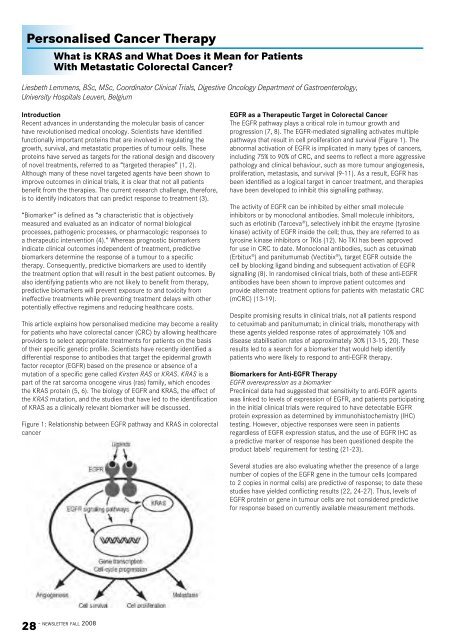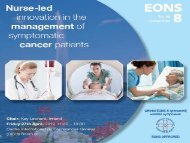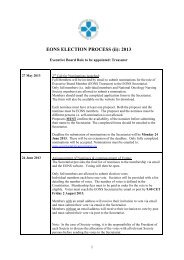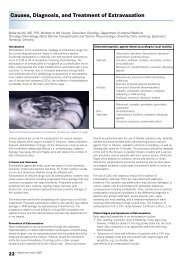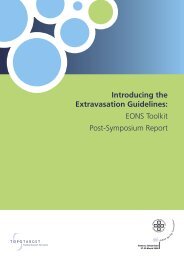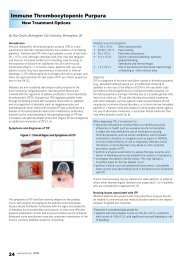English - the European Oncology Nursing Society
English - the European Oncology Nursing Society
English - the European Oncology Nursing Society
- No tags were found...
Create successful ePaper yourself
Turn your PDF publications into a flip-book with our unique Google optimized e-Paper software.
Personalised Cancer TherapyWhat is KRAS and What Does it Mean for PatientsWith Metastatic Colorectal Cancer?Liesbeth Lemmens, BSc, MSc, Coordinator Clinical Trials, Digestive <strong>Oncology</strong> Department of Gastroenterology,University Hospitals Leuven, BelgiumIntroductionEGFR as a Therapeutic Target in Colorectal CancerRecent advances in understanding <strong>the</strong> molecular basis of cancer The EGFR pathway plays a critical role in tumour growth andhave revolutionised medical oncology. Scientists have identified progression (7, 8). The EGFR-mediated signalling activates multiplefunctionally important proteins that are involved in regulating <strong>the</strong> pathways that result in cell proliferation and survival (Figure 1). Thegrowth, survival, and metastatic properties of tumour cells. These abnormal activation of EGFR is implicated in many types of cancers,proteins have served as targets for <strong>the</strong> rational design and discovery including 75% to 90% of CRC, and seems to reflect a more aggressiveof novel treatments, referred to as “targeted <strong>the</strong>rapies” (1, 2). pathology and clinical behaviour, such as more tumour angiogenesis,Although many of <strong>the</strong>se novel targeted agents have been shown to proliferation, metastasis, and survival (9-11). As a result, EGFR hasimprove outcomes in clinical trials, it is clear that not all patients been identified as a logical target in cancer treatment, and <strong>the</strong>rapiesbenefit from <strong>the</strong> <strong>the</strong>rapies. The current research challenge, <strong>the</strong>refore, have been developed to inhibit this signalling pathway.is to identify indicators that can predict response to treatment (3).The activity of EGFR can be inhibited by ei<strong>the</strong>r small molecule“Biomarker” is defined as “a characteristic that is objectivelyinhibitors or by monoclonal antibodies. Small molecule inhibitors,measured and evaluated as an indicator of normal biologicalsuch as erlotinib (Tarceva ® ), selectively inhibit <strong>the</strong> enzyme (tyrosineprocesses, pathogenic processes, or pharmacologic responses to kinase) activity of EGFR inside <strong>the</strong> cell; thus, <strong>the</strong>y are referred to asa <strong>the</strong>rapeutic intervention (4).” Whereas prognostic biomarkers tyrosine kinase inhibitors or TKIs (12). No TKI has been approvedindicate clinical outcomes independent of treatment, predictive for use in CRC to date. Monoclonal antibodies, such as cetuximabbiomarkers determine <strong>the</strong> response of a tumour to a specific(Erbitux ® ) and panitumumab (Vectibix ® ), target EGFR outside <strong>the</strong><strong>the</strong>rapy. Consequently, predictive biomarkers are used to identify cell by blocking ligand binding and subsequent activation of EGFR<strong>the</strong> treatment option that will result in <strong>the</strong> best patient outcomes. By signalling (8). In randomised clinical trials, both of <strong>the</strong>se anti-EGFRalso identifying patients who are not likely to benefit from <strong>the</strong>rapy, antibodies have been shown to improve patient outcomes andpredictive biomarkers will prevent exposure to and toxicity from provide alternate treatment options for patients with metastatic CRCineffective treatments while preventing treatment delays with o<strong>the</strong>r (mCRC) (13-19).potentially effective regimens and reducing healthcare costs.Despite promising results in clinical trials, not all patients respondThis article explains how personalised medicine may become a reality to cetuximab and panitumumab; in clinical trials, mono<strong>the</strong>rapy withfor patients who have colorectal cancer (CRC) by allowing healthcare <strong>the</strong>se agents yielded response rates of approximately 10% andproviders to select appropriate treatments for patients on <strong>the</strong> basis disease stabilisation rates of approximately 30% (13-15, 20). Theseof <strong>the</strong>ir specific genetic profile. Scientists have recently identified a results led to a search for a biomarker that would help identifydifferential response to antibodies that target <strong>the</strong> epidermal growth patients who were likely to respond to anti-EGFR <strong>the</strong>rapy.factor receptor (EGFR) based on <strong>the</strong> presence or absence of amutation of a specific gene called Kirsten RAS or KRAS. KRAS is a Biomarkers for Anti-EGFR Therapypart of <strong>the</strong> rat sarcoma oncogene virus (ras) family, which encodes EGFR overexpression as a biomarker<strong>the</strong> KRAS protein (5, 6). The biology of EGFR and KRAS, <strong>the</strong> effect of Preclinical data had suggested that sensitivity to anti-EGFR agents<strong>the</strong> KRAS mutation, and <strong>the</strong> studies that have led to <strong>the</strong> identification was linked to levels of expression of EGFR, and patients participatingof KRAS as a clinically relevant biomarker will be discussed.in <strong>the</strong> initial clinical trials were required to have detectable EGFRprotein expression as determined by immunohistochemistry (IHC)Figure 1: Relationship between EGFR pathway and KRAS in colorectal testing. However, objective responses were seen in patientscancerregardless of EGFR expression status, and <strong>the</strong> use of EGFR IHC asa predictive marker of response has been questioned despite <strong>the</strong>product labels’ requirement for testing (21-23).Several studies are also evaluating whe<strong>the</strong>r <strong>the</strong> presence of a largenumber of copies of <strong>the</strong> EGFR gene in <strong>the</strong> tumour cells (comparedto 2 copies in normal cells) are predictive of response; to date <strong>the</strong>sestudies have yielded conflicting results (22, 24-27). Thus, levels ofEGFR protein or gene in tumour cells are not considered predictivefor response based on currently available measurement methods.28 - newsletter fall 2008


